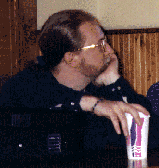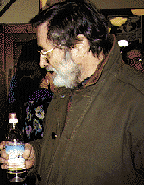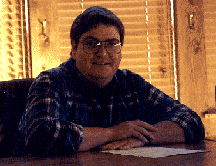Digital Storytelling Festival: Saturday, Oct. 14, 1995
New Possibilities
or a Solution in Search of a Problem?
Two Perspectives on Interactivity
The marathon panel talk Saturday morning here at Crested
Butte exposed a rift in attitude as unavoidable as the nearby Continental
Divide.
On one side: artists who view interactive stortelling as an opportunity
to create works of art that find completion in the mind of the audience.
On the other: artists who doubt that interactivity and storytelling can
coexist at the level of art.
Here are some of the perspectives that bubbled up from the panel and in
the discussion. (Direct quotes are verbatim; others are summary.)

GREG ROACH
Storytelling has always been interactive from its genesis in live theater.
"We have yet to find the language that makes it seamless." Who
knew, in the early days of cinema, that the cut would work, and would become
a natural part of the language of movies?
"When producers look at a title, they sometimes say things like, 'That's
a beautiful piece -- but its not interactive enough.' They're trying to
judge things on the basis of raw interactivity. That's just insane."

PEDRO MEYER
"If serious digital storytelling is to emerge, I have a suspicion it
will not be in the realm of interactivity." Do people really want to
go through a story by clicking on buttons? Most interactivity is really
just multiple choice.
"There are people who buy kits and build their computers themselves.
I don't have time or interest in that. I don't want to finish the story
for the storyteller."

JOHN SANBORN
"There's always somebody who comes along and says that people want
to be told stories -- that they don't want to make them up themselves. Aren't
they alive? Don't they make up stories themselves every day?"
Whenever we listen to a story, we think of the choices we'd make, we watch
the choices the author makes, and we decide whether they please us.
We're trying to get beyond branching narrative to movies that are made up
on the fly. "Too many things are created for an existing technology
than for an imaginable technology."
"The imagination of our viewers is the missing component that completes
the work."
A poem doesn't tell you what it's about" -- you read it and find its
meaning for yourself.

JOE LAMBERT
"If you have 64 different endings for your movie, most of them aren't
going to be very good. I want to see the one you think works the best. Show
me your best shot."

JOHN MCDAID
A McLuhanesque perspective:
Orality -- the oral storytelling tradition -- arose to solve the problem
of memory, of knowledge transmission from one generation to the next.
Literacy -- the print tradition -- arose to break the rigidity of the oral
tradition and allow innovation and experiment to take place.
In orality, linearity is a feature; in print, it's a bug.
Digitality -- the emerging digital tradition -- lets us exteriorize the
nonlinear experiences of dreams, drugs and high altitude experiences like
we're having here. In the 20th century -- with quantum physics and the theory
of relativity -- we're moving away from the notion that there's only one
path to follow.
"Print is about making fixity out of flux. It's no accident that morphing
comes along in our culture right now."

LUIS CROSTHWAITE
Does literature translate into bytes? Literature and the movies embraced
without complications. "What literature lost when it became a visual
story, it regained in new creative possibilities."
In the digital transition, how can we make sure literature gains something?
How much does the story lose outside its written context?
Will the stories my grandmother told keep their power without the old woman
standing by the bedside, "smelling of tobacco and tequila?"
KATE ADAMS
"What I hear from the panel is that you care about making art -- but
the stories I love are the ones that make me feel that the storyteller cares
about me."
 Of course, my effort to divide these individual
attitudes into two distinct groups may just be a byproduct of what John
McDaid called "the agonic principle" -- the concept of dramatic
conflict (agon) that has driven much narrative art for centuries,
but which he argues may not be a useful principle for interactive art.
Of course, my effort to divide these individual
attitudes into two distinct groups may just be a byproduct of what John
McDaid called "the agonic principle" -- the concept of dramatic
conflict (agon) that has driven much narrative art for centuries,
but which he argues may not be a useful principle for interactive art.
Perhaps I am just an agon addict.
--Scott Rosenberg






 Of course, my effort to divide these individual
attitudes into two distinct groups may just be a byproduct of what John
McDaid called "the agonic principle" -- the concept of dramatic
conflict (agon) that has driven much narrative art for centuries,
but which he argues may not be a useful principle for interactive art.
Of course, my effort to divide these individual
attitudes into two distinct groups may just be a byproduct of what John
McDaid called "the agonic principle" -- the concept of dramatic
conflict (agon) that has driven much narrative art for centuries,
but which he argues may not be a useful principle for interactive art.